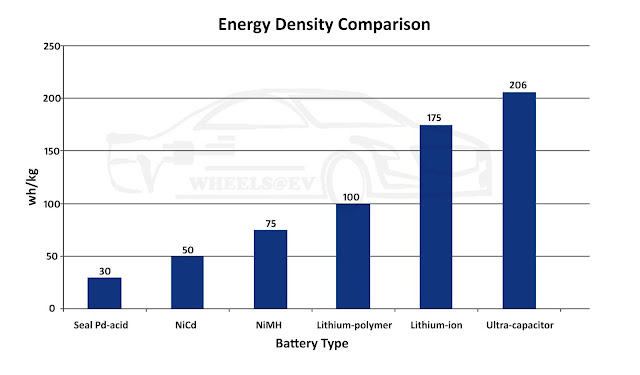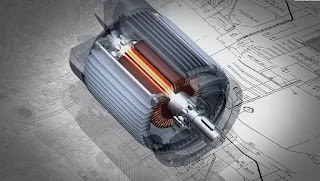Types of Batteries used in Electric Vehicles.
Nowadays, Electric/battery vehicles are widespread and most popular option for future mode of vehicles. In EVs, batteries are the most important and expensive component. Batteries stores the energy and converts this energy into motion on wheels whenever required.
Different types of batteries are used in electric vehicles. Each battery types have different characteristics and energy density. Energy density is basically amount of energy in given mass, usually expressed in wh/kg.
1. Lead acid
2. Nickel Metal hydride
3. Lithium ion
4. Ultracapacitors
Lead acid
They are one of the oldest types of rechargeable batteries. Invented by a french physicist Gaston Plante on 1859. This battery technology is fully mature and were originally used in early electric vehicles. Despite having small energy to volume ratio and energy to weight ratio, they have ability to supply high surge contents makes it relatively large in power to weight ratio.
Limitations are:-
- Low energy density
- Allows only limited number of discharge cycles
- Not Environment friendly
- Thermal runaway and cannot be stored in discharged condition.
NMH is also a rechargeable type battery uses nickel-Hydroxide as cathode and hydrogen as anode in its chemical reaction to produce and store energy.
Basic concept of NMH cell negative electrode emanated from research on the storage of hydrogen for use as an alternative energy source in the 1970s. Certain metallic alloys were observed to form hydrides that could capture hydrogen in volumes upto nearly a thousand times their own volume.
By careful selection of the alloy constituents and proportions, the thermodynamics could be balanced to permit the absorption and release process to proceed at room temperatures and pressures. Now the technology is mature, so NMH can now be used for high voltage automotive applications.
Energy density is around 65-75 wh/kg. NMH is almost maintenance free and can last upto the lifetime of the car. Life cycle is around 3000 cycles and its has wide operating temperature range.
Comparatively more safe than lithium and lead acid batteries.
Limitations are:-
- Limited supply of rare earth element
- High self discharge
- Suffers from memory effect
- Deteriorates during long time storage
- Only deliver full power upto 50% DOD depending on application
- Cell voltage is only 1.2V. So many cells are required to make up high voltage.
Lithium ion cells are now considered to be the standard for modern battery electric vehicles. Many types of lithium ion batteries are there.
- Lithium ion phosphate
- Lithium cobalt oxide
- Lithium manganese oxide
- Lithium nickel manganese cobalt oxide
- Lithium nickel cobalt aluminium oxide
- Lithium Titanate
Vehicle manufacturers are mainly focused on variants having excellent longevity. Lithium ion phosphate are normally used by most of the vehicle manufacturers. Technology of lithium ion cells are still developing, but still it has many advantage over other cells. Energy density is around 175 wh/kg. Self discharge is also very low nearly 5% per month.
Limitations are:-
- Requires protection circuit and cooling system
- Subject to ageing if stored for a long time
- Over charging and over heating issue
- Can cause thermal runaway, which can trigger fire and explosions.
Ultracapacitors
An Ultracapacitor/ Supercapacitor is a device for storing electrical energy just like batteries. Design and mechanism of operation is somewhere between capacitor and battery. It has a positive and negative electrode, separated by an electrolyte. Unlike battery, ultracapacitor stores energy electrostatically like capacitor rather than chemically.
Energy density is around 206 wh/kg, which is very high compared to other types of cells.
Reasearch from the last few years have allowed us to explore the possibilities of ultracapacitors in energy storage system of EVs.
They have high energy density, Short charging cycle as well as wide range of operating temprature.
Reasearch from the last few years have allowed us to explore the possibilities of ultracapacitors in energy storage system of EVs.
They have high energy density, Short charging cycle as well as wide range of operating temprature.
Limitations are:-
- Technology is still under development
- High cost
- Not suitable for long term energy storage as discharge rate is high.
Comment your queries and ideas. Keep reading.









one ultra capacitor in development is using molecular carbon and it stores electrons on each molecule -- or some thing like that so future batteries are WOW
ReplyDelete